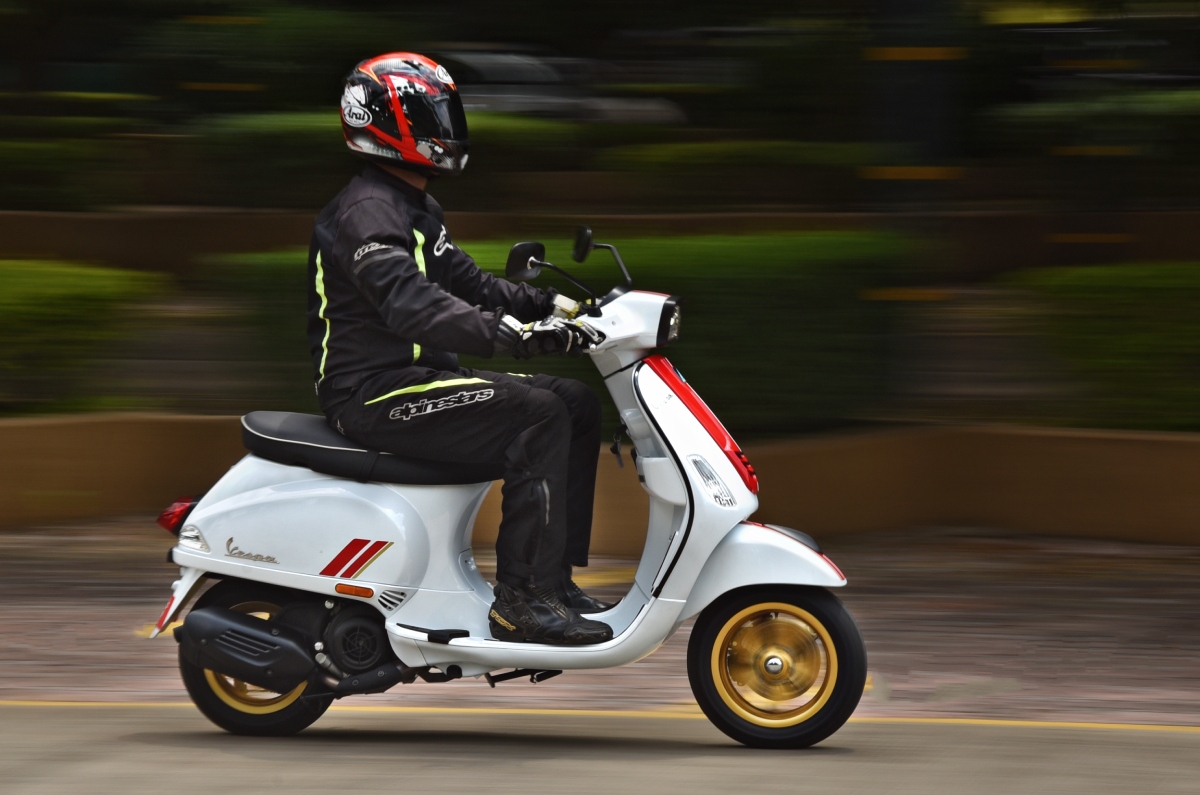
If you were to flip through the pages of history, you'd be hard pressed to find a scooter brand that’s got as big a cult-following and is as desirable as the Vespa. For long, Vespas have stood out for their unmatched style and that factor alone has helped the Italian scooter create a niche for itself. So how does a company that designs effortlessly good looking scooters make them look even better? By launching special editions.
What makes the Racing Sixties edition so special?
It is the cosmetic embellishments, of course. This scooter is essentially the 2020 Vespa SXL with a paint scheme that instantly grabs your attention the moment you set your eyes on it.
Vespa says the theme was inspired by racing liveries in the sixties – the colour combination definitely accentuates this. The white base colour has an attractive, pearlescent finish that gleams in the sun. Adding welcome doses of contrast are the red and gold stripes on the front mudguard and apron, and on the side and rear panels. They remind one of yesteryear’s race machines that flaunted such stripes with pride. Completing the sixties theme are the gold wheels that look attractive, especially when in motion.
In fact, it is hard to point out an area on the scooter that looks out of place. The attention to detail is really that good. Vespa has even gone a step further and finished the rim of the square LED headlamp, mirrors and the exhaust muffler shield in matte black, in the interest of sticking to the retro yet sporty appearance of the scooter.
On the whole, the Vespa Racing Sixties will have people swooning over its good looks and it will manage to turn heads wherever it goes.
But as beautiful as it is, I wish Vespa had thrown in more features, apart from the new LED headlamp, the under-seat USB charger and the boot lamp – these are now standard across the 2020 Vespa range. Maybe a Bluetooth-enabled digital dash in a future update, eh Vespa?
What is at the heart of the Racing Sixties edition?
Underneath the attractive bodywork (I need to stop gushing now!), the Racing Sixties is the same as the standard Vespa SXL 125/150. The 125cc version makes 9.93hp at 7,500rpm and 9.6Nm of torque at 5,500rpm. The 150cc Racing Sixties’ engine, meanwhile, develops 10.4hp at 7,600rpm and 10.6Nm of torque at 5,500rpm. The scooter we had on test was the 150cc variant and we'd like to state from the outset that we only spent an hour riding it in Pune's lanes.
First impressions of the new engine are quite positive. In the transition from BS4 to BS6 norms, Piaggio has dropped the engine displacement of the 3-valve engine from 154.8cc to 149.5 cc, but that hasn't resulted in a significant drop in power or torque. In fact, power is up by 0.20hp though peak torque is down from 10.9Nm to 10.6Nm.
Thumb the starter and the fuel-injected, air-cooled single settles into a refined idle. Piaggo has done well to dampen vibrations and that holds true even as speed rises. The only let-down, is that the motor has lost the sense of urgency that was present in the BS4 model. Nevertheless, only a proper test will reveal whether there's been a significant impact on performance or not.
What is the Racing Sixties edition like to ride?
Carrying forward the good bits from the BS4 model, the Vespa Racing Sixties' monocoque chassis inspires confidence around bends. This is thanks to the crystal clear feedback from the chassis. The MRF tyres (110/70-11 front and 120/70-10 rear) offer sufficient grip as well, and it only took a few corners for us to gain faith in the Vespa's abilities.
The trailing link suspension at the front and monoshock at the rear are also responsible for its planted manners, but there is no denying that this comes at the cost of ride quality, to some extent. During this short test, we noticed that the Vespa rides well over small undulations and medium-sized potholes, despite the slightly stiff rear. However, it thuds over large expansion gaps and deep craters, clearly being vocal about its dislike for the road conditions. That said, the ride is acceptable for the most part and personally I don't mind it.
The brakes are decent, but could do with more feel, especially at the front. What I did appreciate is the ABS system. It is not too intrusive. However, once it comes on, it stays for a while.
Should I buy the Racing Sixties edition?
At Rs 1.20 lakh for the 125cc variant and 1.32 lakh for the 150cc scooter, the Racing Sixties commands a Rs 5,000-6,000 premium over the corresponding, standard Vespa SXL variants.
You could argue that the price gap is large for what is essentially the same scooter with a different paint scheme, and your rational side may not agree. But then again, buying a Vespa has always been a case of heart winning over head. And if this special edition paintwork is what your heart desires you will probably find yourself making the stretch.
Prices, ex-showroom, Delhi











0 komentar:
Post a Comment